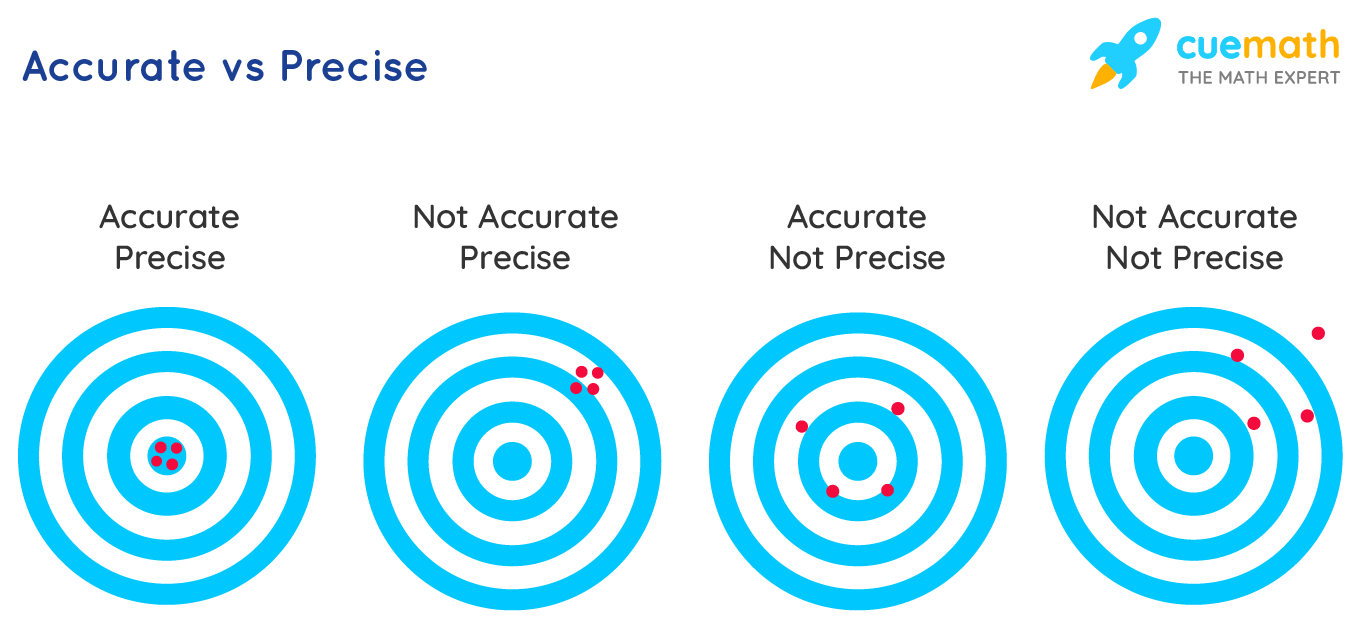Accurate vs Precise
Our day-to-day activities are incomplete without measurements. Measurements require tools, either conventional or unconventional, and different people may get different results using the same instrument. This leads to measurements of a value that can be either accurate or precise. For any measured value, accuracy refers to how close a measured value is to the actual value. Precision is how close the various measured values are to each other.
| 1. | Accurate and Precise Definition |
| 2. | Difference Between Accurate and Precise |
| 3. | Solved Examples on Accurate vs Precise |
| 4. | Practice Questions on Accurate vs Precise |
| 5. | FAQs on Accurate vs Precise |
Accurate and Precise Definition
Accurate is defined as the closeness of a value to its true value, such as the closeness of an arrow to the bull's eye at the center. Accurate is correct, that is the bull's eye. Precise is defined as the repeatability of the values of a measurement, such as the closeness of other arrows to the first one. Precise is repeating, that is hitting the same spot, but that may not even be the correct spot.
Observe the figure given below which differentiates between 'Accurate' and 'Precise'.


The accuracy of a number is given by the number of digits to the right of the decimal. Precision is the maximum number of digits to the right of the decimal. Answers may vary as two people might be considering different values. Thus, accuracy and precision are two important factors to be considered while taking measurements. Both reflect how close a measurement is to a known or accepted value. If you weigh a given substance five times and get 1.2 lbs each time, then your measurement is very precise but not necessarily accurate. It's because you are getting values that are close to each other, but may not be close to the actual value.
Difference Between Accurate and Precise
People often end up using the two terms, accurate and precise, interchangeably. But, accuracy and precision are two different terms and it is important to understand the difference between these two. Let's explore the difference between the two.
| Accuracy | Precision |
|---|---|
|
The degree of correctness to the true or exact value. |
The degree of exactness to the values obtained each time. |
|
The closeness of the measured value to a standard or true value. |
The closeness of two or more measured values, to each other. |
| Single measurement | Multiple measurements |
| For something to be accurate consistently, it must be precise. | Precision is independent of accuracy. |
Thinking Out of the Box!
- Determine the measurements as accurate or precise in the following cases:
- When the darts are neither close to the bull's eye, nor close to each other.
- When all the darts land very close together, but far from the bull's eye.
- When the darts land close to the bull's eye and close together.
Important Notes
Now, let us recollect some important facts related to accurate vs precise:
- Accuracy is how close a value is to its true/actual value.
- Precision is conformity or repeatability of values.
- Percent error (the ratio of the error to the actual value multiplied by 100) is used to assess the accuracy or precision of a measurement value.
Solved Examples on Accurate vs Precise
-
Example 1: Jack, a snack food manufacturer, produces bags of potato chips, each measuring 11 oz. He tests the weight of the bags using a scale. There is a little variation in the measurements: 12.2 oz, 12.33 oz, and 12.13 oz, for three samples. What does this tell about the scale?
Solution: Three samples are 12.2 oz, 12.33 oz, and 12.13 oz. respectively, which means, there is a variation in the measurements. Thus, the scale measures the bags precisely, but not accurately. Therefore, the measurements of the three samples are precise.
-
Example 2: Measurement of the mass of a 5 lbs standard sample:
(i) Values - 4.5, 4.6, 4.5, and 4.7 lbs
(ii) Values - 4.8, 5.1, 5.0, and 4.9 lbs
Check the values and determine if the given measurements are precise or accurate.Solution:
(i) Precise (there is a little variation in the measurements)
(ii) Accurate (close to the true value) -
Example 3: Observe the two given sets and find out which set of data is more precise.
Set A: 33.49, 33.47, 33.29, 33.40, 33.28
Set B: 16.80, 16.81, 16.90, 16.78, 16.85
Solution:In order to check which set of data is more precise:
- Step 1: Select the lowest value and the highest value from each set.
- Step 2: Subtract:
Set A = 33.49 - 33.28 = 0.21
Set B = 16.90 - 16.78 = 0.12
This shows that sample B has a lower range. Therefore, the data in set B is more precise.

Practice Questions on Accurate vs Precise
FAQs on Accurate vs Precise
Can a Measurement be Both Accurate and Precise?
Yes, measurements can be both accurate and precise depending on the values.
How can Results be Precise But Not Accurate?
Precision refers to how close the measurements of the same item are to each other. Precision is independent of accuracy. That means it is possible to be very precise but not very accurate, and it is also possible to be accurate without being precise.
Which is More Important Accuracy or Precision?
Both accuracy and precision are important. Accuracy is generally more important when trying to hit a target. On the other hand, precision is more important in calculations.
What Affects Precision?
Precision gets affected by the units as it depends on the unit used to obtain a measure. The smaller the unit, the more precise the measure.
Does Repeating an Experiment Increase Accuracy or Precision?
Repeating an experiment many times might lead to an improvement in the precision of experimental measurements as the uncertainties related to precision are random and more often. Also, systematic errors never “average away”, accuracy will not get affected.
visual curriculum
